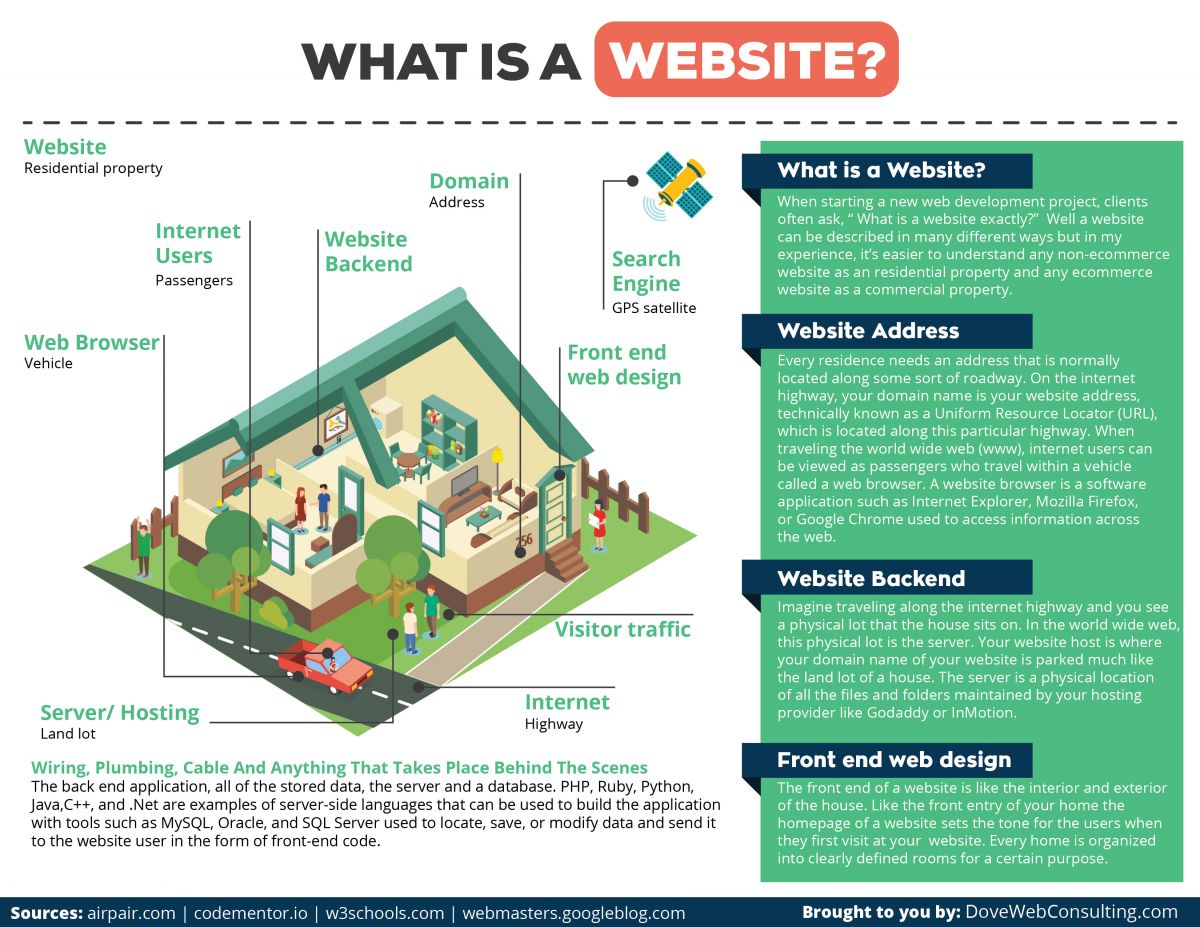Spring Hill KS, 66083
- Home
- > Blog Main Page
- > Websites
- > What is a Website?
What is a Website?
When starting a new web development project, clients often ask, "What is a website exactly?" Well, a website can be described in many different ways. Still, in my experience, it's easier to understand any non-eCommerce website as a residential property and any eCommerce website as a commercial property. This article will focus on a non-eCommerce website's leading parts and compare these concepts to various residential property sections.

<b>++ Click Image to Enlarge ++</b><br><a href="https://dovewebconsulting.com/blog/what-is-a-website/"><img src="https://dovewebconsulting.com/mt-content/uploads/2017/08/thumbnails/what-is-a-website_l_1200x927.jpg" "="" alt="What Is A Website?"></a><br>Source: <a href="https://dovewebconsulting.com/blog/what-is-a-website/">What Is A Website?</a>
Website Address
Every residence needs an address located along with some roadway. On the internet highway, your custom domain name is your website address, technically known as a Uniform Resource Locator (URL), located along this particular highway. When traveling the world wide web (www), internet users, viewed as passengers, travel within a vehicle called a web browser.

A website browser is a software application such as Internet Explorer, Mozilla Firefox, or Google Chrome to access information across the web. Just like a windshield, a URL address bar of an internet browser allows users to access your website directly. Still, they can also use a software system known as a search engine such as Google, Yahoo, or Bing. Search engines act like GPS satellite that searches for the most helpful information to the users as they travel across the web. Check out my blog article on the Top 3 Search Engines that you can use for FREE business listings because you can still promote your local business across the web even if you don't have a website.
Website Backend
Imagine traveling along the internet highway and seeing a physical lot that the house sits on. In the worldwide web, this physical lot is the server. The server is part of the web site's website backend, which relates to anything the user does not see on the front end of the website. Your website host is where your domain name is parked, much like the house's land lot. The server is a physical location of all the files and folders maintained by your hosting providers like Godaddy or InMotion. Like the idea of renting land to build a house, you pay the hosting provider to store the files on your website.

The website backend is much like the wiring, plumbing, cable, and anything behind the scenes. The backend of a website consists of an application. All of the stored data, the server, and a database. PHP, Ruby, Python, Java, C++, and .Net are examples of server-side languages. Server-side languages build applications with tools such as MySQL, Oracle, and SQL. The server locates, saves, or modifies data and sends it to the website user in front-end code. The backend of a website is the content management system. WordPress, Joomla, MotoCMS, etc., can be pictured as the basement of a house because they maintain the backend components that allow the front end of the website to exist.
Front end web design
A website's front end is like the house's interior and exterior. Like your home's front entry, a website's homepage sets the tone for the users when they first visit your website. Every house, organized into clearly defined rooms, has a purpose. We use the kitchen to prepare meals, the bedrooms are for sleeping, the living room is for relaxing, and so on, but you get the idea. Similarly, each page of a website has a specific purpose. Hypertext Markup Language (HTML) is the structure used to define the purpose of the web pages, like a house's structure.
A house also contains furniture and electrical appliances in every room. For a website, these things are the HTML elements, which are the building blocks used to tag or label the page content, such as the "header," "footer," "body," "paragraph," "table," and so on. Cascading Style Sheets (CSS) describe how the HTML elements are displayed, and JavaScript describes how the web pages behave. JavaScript frameworks like Bootstrap, Foundation, Backbone, AngularJS, and EmberJS are standard for most professional websites. These frameworks guarantee content that can fit any device and libraries such as jQuery package code into a more helpful form by saving time in website development and performance.
What makes a good website?
Buying a website or hiring a web developer to create one is like buying a house. You want it to have a superior front-end web design and all the must-have features. At the same time, it's just as important to have your website backend function well as a house's piping and wiring.

It makes no difference how beautiful your furniture and flooring are if there's a leaky roof when it's raining. That's why it's critical to guarantee that your house, like a website, has a good structure. Do you know how the design of your website holds up? Please request a free site analysis at any time from us to see where your website stands.



